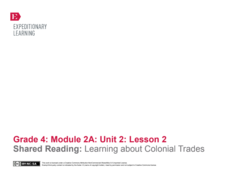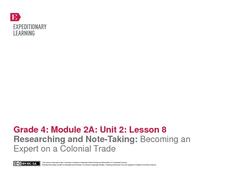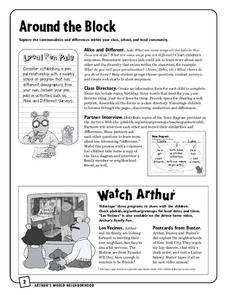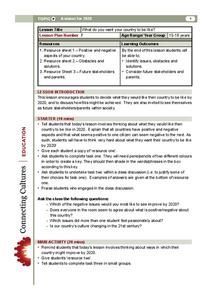Curated OER
Dealing with Peer Influence: What Are Bullying and Harassment? Lesson 1 of 2
Fifth graders review definitions of bullying and harassment, respond to real-life bullying scenario from news, television, or movie, brainstorm possible solutions and consequences for negative behavior, and discuss how their peers...
PACER Center
The Peer Advocacy Guide
Teasing, mocking, and disrespect can be the hallmarks in the life of those with disabilities. Disrupt the cycle of abuse with a toolkit designed to turn peers into advocates for all those who are bullied. Everything needed to create a...
EngageNY
Reading and Taking Notes on Colonial Trades
In the tenth instructional activity of this unit, young scholars learn to categorize information as they continue researching their colonial trade. During guided practice, the teacher models how to read informational text slowly while...
Bully Free Systems
Bully Free Lesson Plans—Eighth Grade
Middle schoolers are likely very familiar with the concept of bullying and cliques. Discuss their experiences and brainstorm ways to handle peer conflict and feelings of exclusion with a poem that focuses on bullying, and a second...
Curated OER
What's Your Thing? Self-Esteem, Peer Support
Students explore their personal strengths. After participating in group discussions, students list verbs that describe their talents. They observe a commercial describing characteristics and talents. Students create their own mini-talent...
EngageNY
Shared Reading: Learning About Colonial Trades
Trading in Colonial America is the focus of a lesson plan that boosts reading skills. As a class, scholars examine the informational text for crucial details, use their newfound knowledge to share information with their peers, and write...
New York State Education Department
TASC Transition Curriculum: Workshop 7
Designed specifically for math instructors, the seventh workshop of a 15-part series allows time to explore Webb's DOK, ponder open-ended questions, and create lessons to apply what is learned. Teachers craft high-quality math problems...
EngageNY
Researching and Note-Taking: Becoming an Expert on a Colonial Trade
Fourth graders work in small groups to become experts on different colonial trades in the eighth instructional activity of this unit. Working toward the long-term goal of writing a piece of historical fiction, young scholars read...
EngageNY
Synthesizing Research: How Colonists Were Interdependent
Following the formative assessment of this unit, young scholars present the information they gathered on their specific colonial trade to the rest of the class. Working in groups, learners create posters describing the particular job...
Curated OER
Income and Outcomes
Bring financial literacy into your classroom. Learners use peer support to reflect on their spending and how it reflects their income and their values.
Curated OER
Changing Seasons
Explore expository writing and using precise language in this descriptive paragraph writing lesson. Learners brainstorm prior knowledge about the changing seasons in Ohio. They describe seasonal items, view seasonal pictures from...
Curated OER
Changes, Choices, and Lessons
The teen years are nothing but a series of personal, social, and academic changes. Help kids understand what to expect as they mature and give them ways to make good decisions. After discussing they types of changes they'll go through,...
Lemos and Crane
Homophobic Bullying
Discuss homophobia and bullying with a collaborative and supportive lesson. Class members engage in a series of activities focused on the ways bullies use physical, verbal, mental and emotional, sexual, and cyber tactics to spread...
Curated OER
Teaching Social Studies in English
Case studies, an examination of images, and readings of passages from the UN Convention on the Rights of the Child are used to spark conversations in ESL/ELD social studies classes about this highly-charged topic. Using a variety of...
Poofy Cheeks
Back to School
A new school year means building relationships with a new group of interesting, unique young children. Get the process started with this simple survey that asks for students' basic information as well as their favorite subject,...
Education World
My Favorite Things
Celebrate your students' individuality with this simple back-to-school activity. Offering six sentence frames asking for students' favorite subject, book, lunch, and more, this activity will help break the ice during the first days...
Council for the Curriculum, Examinations and Assessment
Morals, Values and Beliefs
Your personality is based on the things you believe in, the morals you abide by, and the values upon which you make your decisions. Delve into a set of lessons about values and moral framework with your eighth graders as...
Partners Against Hate
Building Community and Combating Hate
Put a little love in your classroom! Help middle school scholars understand differences among people and build a sense of community within their school through 10 well-organized lessons. Each unique lesson incorporates writing,...
PBS
Around the Block
Arthur and his friends help children explore the concepts of family, community, and diversity in a fun series of activities. From performing peer interviews to mapping out the different places students have lived or visited, this...
University of the Desert
What Do You Want Your Country to be Like?
How would you like your country to be by 2020? What issues do you feel are most important, and how do those compare with your peers? Learners tackle questions regarding the evolving national and global culture of the twenty-first century...
Angel Island Immigration Station Foundation
Exclusion "Act"ivity
Two simulations highlight the feelings individuals experienced when immigrating to Angel Island. During the first simulation, scholars listen to and answer questions, divided based on their answers. The second simulation pins learners as...
Curated OER
Understanding Causes of Global Conflict: Peer Interviews
Students examine sources of conflict. In this global conflict lesson, students discuss how peer pressure, bias, oppression, ethnocentrism, miscommunication, and fear contribute to personal conflict as well as global conflict. Students...
Bully Free Systems
Bully Free Lesson Plans—Seventh Grade
Having a hard time defining bullying with your seventh graders? Discuss the different types of behavior one would see in a bullying situation with a series of lessons, worksheets, and group activities.
US Institute of Peace
What Does Conflict Mean?
Is conflict always bad? Learners begin a unit on conflict resolution with an exercise that defines conflict, reviews common words associated with conflict, and encourages partners to brainstorm conflicts that may have positive results.























